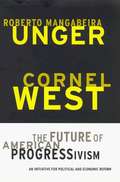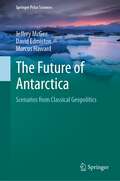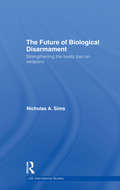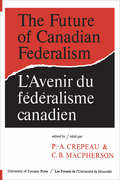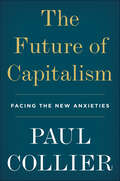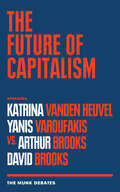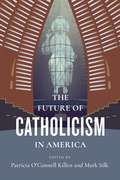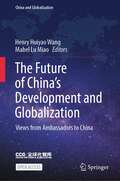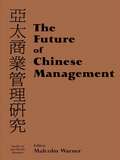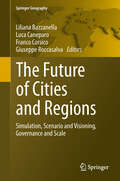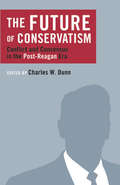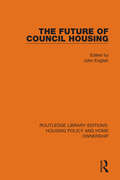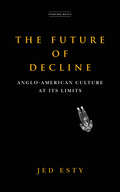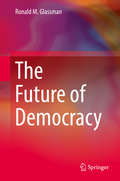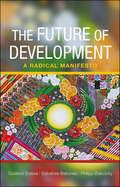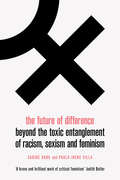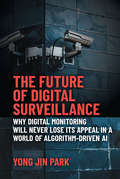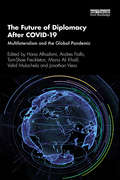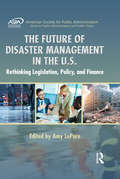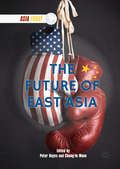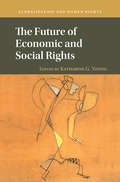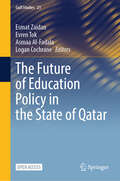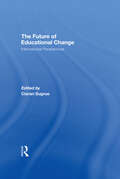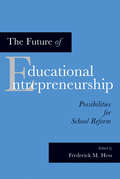- Table View
- List View
The Future of American Progressivism: An Initiative For Political And Economic Reform
by Cornel West Roberto M. UngerSeizing the quintessentially American idea that everything is possible, Unger and West argue that we can stimulate economic growth and guarantee opportunity and sufficient resources for all citizens. They propose specific reforms in business, taxation, social security, and education, and their program is an image of American political and civic life as a vital, evolving, and hopeful arena for solving our collective problems. Theirs is an all-inclusive, bipartisan, business-friendly vision.
The Future of Antarctica: Scenarios from Classical Geopolitics (Springer Polar Sciences)
by Marcus Haward Jeffrey McGee David EdmistonAs global great power competition intensifies, there is growing concern about the geopolitical future of Antarctica. This book delves into the question of how can we anticipate, prepare for, and potentially even shape that future? Now in its 60th year, the Antarctic Treaty System has been comparatively resilient and successful in governing the Antarctic region. This book assesses how our ability to make accurate predictions about the future of the Antarctic Treaty System reduces rapidly in the face of political and biophysical complexity, uncertainty, and the passage of time. This poses a critical risk for organisations making long-range decisions about their policy, strategy, and investments in the frozen south. Scenarios are useful planning tools for considering futures beyond the limits of standard prediction. This book explores how a multi-disciplinary focus of classical geopolitics might be applied systematically to create scenarios on Antarctic futures that are plausible, rigorous, and robust. This book illustrates a pragmatic, nine-step scenario development process, using the topical issue of military activities in Antarctica. Along the way, the authors make suggestions to augment current theory and practice of geopolitical scenario planning. In doing so, this book seeks to rediscover the importance of a classical (primarily state-centric) lens on Antarctic geopolitics, which in recent decades has been overshadowed by more critical perspectives. This book is written for anyone with an interest in the rigorous assessment of geopolitical futures - in Antarctica and beyond.
The Future of Australian Federalism
by Gabrielle Appleby Nicholas Aroney Thomas John"At a time when the operation and reform of federal relations within Australia is squarely on the political agenda, this volume brings together eminent lawyers, economists and political scientists who explain, analyse and evaluate the theory and principles underpinning the Australian federal system. Topics covered include the High Court's approach to the interpretation of the Constitution and how this has influenced federal relations in practice; different forms of inter-governmental co-operative arrangements; fiscal relations between the Commonwealth and the States; and emergent ethno-cultural and socioeconomic diversity within the Australian Federation. Comparative perspectives from Germany, America, Canada, Switzerland, India and the European Union provide unique prisms through which to view the operation of the Australian system and to contemplate its reform"--
The Future of Biological Disarmament: Strengthening the Treaty Ban on Weapons (LSE International Studies Series)
by Nicholas A. SimsThis book examines the politics of biological disarmament, focusing on the Biological Weapons Convention (BWC) as a treaty regime and the cornerstone of biological disarmament efforts. Biological weapons have long been banned, but the ban needs strengthening. The 1972 Biological Weapons Convention (BWC) is the cornerstone of this disarmament regime. After years of deadlock and disappointment its Sixth Review Conference in 2006 generated new hope that biological disarmament could be reinforced from within. This book studies the intricate diplomacy of the Sixth Review Conference as a key moment in the recovery of self-confidence by the treaty parties. It makes detailed proposals for developing an accountability framework and stronger institutions so that the treaty regime can work better. It examines alternative futures for the BWC and the trajectories to be avoided or encouraged in the short, medium and longer terms as its regime evolves. Controversially, by comparing treaty constraints on biological, chemical and nuclear weapons it restores the BWC firmly to the realm of disarmament rather than arms control and rescues it from misleading identifications with counterproliferation and counterterrorism models. This book will appeal to policy-makers, diplomats and students of biological weapons, weapons of mass destruction, international security and IR in general. Nicholas A. Sims is Reader in International Relations at the London School of Economics. He is author of four books on aspects of disarmament.
The Future of Canadian Federalism/L'Avenir du federalisme canadien
by C. B. Macpherson Paul-Andre CrepeauBy the beginning of 1964 public debate about the terms on which French and English culture could continue to co-exist within a single Canadian federal state had become intense. Many causes could be assigned for the intensity of the debate, but one of them evidently was the lack of clear formulation of the problems. It was in these circumstances that the Association of Canadian Law Teachers and the Canadian Political Science Association used their annual meeting at Charlottetown in 1964 to get, on each of four aspects of the current problem of Canadian federalism, a vigorously reasoned statement, by a French-Canadian and an English-Canadian scholar, of the essentials of the problem as he saw it and then, by way of invited commentaries, to bring the ideas more fully into play. The four aspects were: competing concepts of federalism, economic problems peculiar to our federal state, legal and political attitudes towards the BNA Act, and institutional problems of a revision of the Act.
The Future of Capitalism: Facing the New Anxieties
by Paul CollierBill Gates's Five Books for Summer Reading 2019From world-renowned economist Paul Collier, a candid diagnosis of the failures of capitalism and a pragmatic and realistic vision for how we can repair it.Deep new rifts are tearing apart the fabric of the United States and other Western societies: thriving cities versus rural counties, the highly skilled elite versus the less educated, wealthy versus developing countries. As these divides deepen, we have lost the sense of ethical obligation to others that was crucial to the rise of post-war social democracy. So far these rifts have been answered only by the revivalist ideologies of populism and socialism, leading to the seismic upheavals of Trump, Brexit, and the return of the far-right in Germany. We have heard many critiques of capitalism but no one has laid out a realistic way to fix it, until now.In a passionate and polemical book, celebrated economist Paul Collier outlines brilliantly original and ethical ways of healing these rifts—economic, social and cultural—with the cool head of pragmatism, rather than the fervor of ideological revivalism. He reveals how he has personally lived across these three divides, moving from working-class Sheffield to hyper-competitive Oxford, and working between Britain and Africa, and acknowledges some of the failings of his profession.Drawing on his own solutions as well as ideas from some of the world’s most distinguished social scientists, he shows us how to save capitalism from itself—and free ourselves from the intellectual baggage of the twentieth century.
The Future of Capitalism: The Munk Debates (The Munk Debates)
by David Brooks Arthur Brooks Katrina Vanden Heuvel Yanis VaroufakisThe twenty-fifth semi-annual Munk Debate, held on December 4, 2019, pits editorial director and publisher of the Nation Katrina vanden Heuvel and former finance minister of Greece Yanis Varoufakis against Harvard professor Arthur Brooks and New York Times columnist David Brooks to debate whether the capitalist system is broken.“We need to organise politically to defend the weak, empower the many, and prepare the ground for reversing the absurdities of capitalism.” — Yanis VaroufakisIn Western societies, the capitalist system is facing a level of distrust not seen in decades. Economic inequality is rampant. Life expectancy is falling. The environment is being destroyed for profit. Political power is wielded by wealthy elites and big business. For capitalism’s critics, it is clear that the system is not designed to help average people. Their solution is a top-to-bottom reform of the “free market” along more socialist and democratic lines. For proponents of capitalism, however, this system has been the greatest engine of economic and social progress in history. Not only has capitalism made all of us materially better off, its ideals are responsible for everything from women’s rights to a cleaner environment to political freedoms. The answer to society’s current ills is more capitalism, more economic freedom, and more free markets.The twenty-fifth semi-annual Munk Debate, held on December 4, 2019, pits editorial director and publisher of the Nation Katrina vanden Heuvel and former finance minister of Greece Yanis Varoufakis against Harvard professor Arthur Brooks and New York Times columnist David Brooks to debate whether the capitalist system is broken.
The Future of Catholicism in America (The Future of Religion in America)
by Mark Silk Killen Patricia O’ConnellCatholics constitute the largest religious community in the United States. Yet most American Catholics have never known a time when their church was not embroiled in controversies over liturgy, religious authority, cultural change, and gender and sexuality. Today, these arguments are taking place against the backdrop of Pope Francis’s progressive agenda and the resurgence of the clergy sexual abuse crisis. What is the future of Catholicism in America?This volume considers the prospects at a pivotal moment. Contributors—scholars from sociology, theology, religious studies, and history—look at the church’s evolving institutional structure, its increasing ethnic diversity, and its changing public presence. They explore the tensions among members of the hierarchy, between clergy and laity, and along lines of ethnicity, immigration status, class, generation, political affiliation, and degree of religious commitment. They conclude that American Catholicism’s future will be pluriform—reflecting the variety of cultural, political, ideological, and spiritual points of view that typify the multicultural, democratic society of which Catholics constitute so large a part.
The Future of China’s Development and Globalization: Views from Ambassadors to China (China and Globalization)
by Henry Huiyao Wang Mabel Lu MiaoThis is an open access book.As the world continues to recover from the fear and uncertainty of the Covid-19 pandemic, a new set of challenges like increased geopolitical tensions and climate change have become increasingly prominent. This open access book, which contains the views of ambassadors to Beijing on topics ranging from bilateral relations to potential cooperation, global development and even more of the most immediate issues, aims to help readers make sense of our changing world and China’s role in it. Building on the success of our previous volume China and the World in a Changing Context: Perspectives from Ambassadors to China, the Center for China and Globalization (CCG) has invited 27 ambassadors to examine China’s role in this context of constant flux, focusing specifically on China’s perspective, including its trade and investment ties with other countries, as well as its role in multilateral regional relations and global governance. These diplomatic envoys from countries around the world serve as pivotal contact points between nations across a wide range of fields, from economics and culture to health and the environment. Their perspectives, representing both developing and industrialized countries, are both invaluable and illuminating—not only in conveying the views and experiences of their own country, but also for their insights into global affairs and China’s development. It is our hope that the views expressed in this volume will inspire even more discussion on the next best step to take in finding solutions to the problems we face, and in particular how China can use its own experience and wisdom to better contribute and engage with the world in finding solutions together. This book provides a wealth of perspective and insight that we hope will benefit not only academics and policy makers, but also the private sector and individuals.
The Future of Chinese Management: Studies in Asia Pacific Business
by Malcolm WarnerThe papers that comprise this study examine the ongoing state of management reforms in the People's Republic of China. The contributors explain how and why these reforms came about and where they are heading.
The Future of Cities and Regions
by Luca Caneparo Franco Corsico Giuseppe Roccasalva Liliana BazzanellaThis guide for tomorrow's urban practitioner systematically explains fifteen best practices across three continents; it explores questions of broad interest for designing and planning the future of cities and regions. Key questions addressed are: Is simulation useful to explore the effects of different design, policy and planning strategies? Which approach will help manage the uncertainties of metropolitan areas both today and tomorrow ? What are the strengths and weaknesses of the different simulation practices for city leadership, public and private partnership, and citizen involvement? The book reviews computer models and media, socio-political initiatives, professional practices which help communicating the future effects of different design, political and planning strategies with a wide range of aims: from information, through consultation, towards active participation. These world best practices are considered according to four leading issues for urban and regional development, respectively Simulation, Scenario and Visioning, Government and Governance, and Scale. The book examines the approaches adopted technically and procedurally. The selected knowledge and the innovative tools used in each case study are among the most advanced and up-to-date in the professional and research fields. This volume successfully illustrates these innovative practices and methodologies in a straightforward and accessible way.
The Future of Conservatism: Conflict and Consensus in the Post-Reagan Era
by Charles DunnOnce on the wings of the American political stage, conservatism now plays a leading role in public life, thanks largely to the dynamic legacy of Ronald Reagan. But despite conservatism&’s emergence as a powerful political force in the last several decades, misunderstandings abound about its meaning and nature—economically, internationally, philosophically, politically, religiously, and socially. In examining these misunderstandings, The Future of American Conservatism: Consensus and Conflict in the Post-Reagan Era reveals the forces that unite, and the tensions that divide, conservatives today.Edited by noted Reagan scholar Charles W. Dunn, this collection casts conservatism as a collage of complexity that defies easy characterization. Although it is commonly considered an ideology, many of conservatism&’s foremost intellectuals dispute this notion. Although it is thought to embody a standard set of principles, its principles frequently conflict. Although many leading intellectuals, liberal and conservative, believe that conservatism lacks a significant tradition in America, it has contributed more to American life than the credit lines indicate. And although it is usually thought to create homogeneity among its adherents, in truth conservatism is marked by a great deal of heterogeneity in both its adherents and its ideas.In fact, conservatism&’s complexity may well be its strength—or so the essays gathered here suggest. In painting a bright picture of the prospects for conservatives, The Future of American Conservatism is a timely and thought-provoking volume.
The Future of Council Housing
by John EnglishOriginally published in 1982, at a time when the UK government was pursuing the policy of council house sales, this book explores the implications of selling council houses, criticises the housing management and policies of the 1970s and 80s and argues forcefully for the retention of the council housing sector.
The Future of Decline: Anglo-American Culture at Its Limits
by Jed EstyAs the US becomes a second-place nation, can it shed the superpower nostalgia that still haunts the UK? The debate over the US's fading hegemony has raged and sputtered for 50 years, glutting the market with prophecies about American decline. Media experts ask how fast we will fall and how much we will lose, but generally ignore the fundamental question: What does decline mean? What is the significance, in experiential and everyday terms, in feelings and fantasies, of living in a country past its prime? Drawing on the example of post-WWII Britain and looking ahead at 2020s America, Jed Esty suggests that becoming a second-place nation is neither disastrous, as alarmists claim, nor avoidable, as optimists insist. Contemporary declinism often masks white nostalgia and perpetuates a conservative longing for Cold War certainty. But the narcissistic lure of "lost greatness" appeals across the political spectrum. As Esty argues, it resonates so widely in mainstream media because Americans have lost access to a language of national purpose beyond global supremacy. It is time to shelve the shopworn fables of endless US dominance, to face the multipolar world of the future, and to tell new American stories. The Future of Decline is a guide to finding them.
The Future of Democracy
by Ronald M. GlassmanThis book focuses on the processes that help stabilize democracy. It provides a socio-historical analysis of the future prospects of democracy.The link between advanced capitalism and democracy is emphasized, focusing on contract law and the separation of the economy from the state. The book also emphasizes the positive effects of the scientific world view on legal- rational authority. Aristotle’s theory of the majority middle class and its stabilizing effect on democracy is highlighted.This book describes the face to face democracies of the past in order to give us a better perspective on the high tech democracies of the future, making it appealing to students and academics in the political and social sciences.
The Future of Development: A Radical Manifesto
by Gustavo Esteva Salvatore J. Babones Philipp BabcickyOn January 20, 1949 US President Harry S. Truman officially opened the era of development. On that day, over one half of the people of the world were defined as "underdeveloped" and they have stayed that way ever since. This book explains the origins of development and underdevelopment and shows how poorly we understand these two terms. It offers a new vision for development, demystifying the statistics that international organizations use to measure development and introducing the alternative concept of buen vivir: the state of living well. The authors argue that it is possible for everyone on the planet to live well, but only if we learn to live as communities rather than as individuals and to nurture our respective commons. Scholars and students of global development studies are well-aware that development is a difficult concept. This thought-provoking book offers them advice for the future of development studies and hope for the future of humankind.
The Future of Difference: Beyond the Toxic Entanglement of Racism, Sexism and Feminism
by Paula-Irene Villa Sabine HarkHow feminism is used to attack immigration in EuropeIn recent years, opponents of 'political correctness' have surged to prominence from both left and right, shaping a discourse in which perpetrators are 'defiantly' imagined as Muslim refugees, i.e. outsiders/others, while victims are identified as 'our women'. This poisonous and regressive situation grounds Hark and Villa's theorisation of contemporary regimes of power as engaged primarily in the violent production of difference. In this moment, they argue, the logic of 'differentiate and rule' thoroughly permeates the social; our entire 'way of life' is premised on endless subtle hierarchical distinctions, which determine whole populations' attitudes, feelings and actions. How can learn to value difference, sabotaging all attempts to enlist difference in the service of domination? Hark and Villa make a compelling case for the urgent necessity for a detoxification of feminism as a matter of urgency; and for an ethical mode of living-with the world, that is, living with alterity.
The Future of Digital Surveillance: Why Digital Monitoring Will Never Lose Its Appeal in a World of Algorithm-Driven AI
by Yong ParkAre humans hard-wired to make good decisions about managing their privacy in an increasingly public world? Or are we helpless victims of surveillance through our use of invasive digital media? Exploring the chasm between the tyranny of surveillance and the ideal of privacy, this book traces the origins of personal data collection in digital technologies including artificial intelligence (AI) embedded in social network sites, search engines, mobile apps, the web, and email. The Future of Digital Surveillance argues against a technologically deterministic view—digital technologies by nature do not cause surveillance. Instead, the shaping of surveillance technologies is embedded in a complex set of individual psychology, institutional behaviors, and policy principles.
The Future of Diplomacy After COVID-19: Multilateralism and the Global Pandemic
by Hana AlhashimiThis book considers the impact of the COVID-19 pandemic on international diplomacy, and the challenges and opportunities it presents for the future of multilateralism. Global cooperation and solidarity are central to responding to and mitigating the health and socio-economic effects of the COVID-19 pandemic, yet, to many, this was slow to mobilize and lacking in political leadership. This book takes a practical look at the lessons learned from the period spanning the World Health Organization’s first declaration of a public health emergency of international concern in January 2020, to the commemoration of the 75th Anniversary of the United Nations in October 2020. This timespan covers a critical period in which to consider key areas of diplomacy, covering a range of tools of global cooperation: multilateral diplomacy, the rule of law, sustainable development, economics and financing, digital governance, and peace and security. Each chapter in this book introduces readers to the current situation in their respective areas, followed by a constructive consideration of lessons learned from the pandemic’s impact on that field, and key recommendations for the future. The practical focus and future orientation is particularly important as the book injects pragmatism and guidance that will facilitate ‘building back better’ in COVID response plans, while creating space for continued focus on global commitments around sustainable development and the future of the UN. Written by a team of authors who have worked directly in International Public Policy and the establishment of global agendas at the United Nations, this book will be essential reading for professionals and policymakers involved in diplomatic roles, as well as students and scholars interested in the future of international relations, global governance and sustainable development.
The Future of Disaster Management in the U.S.: Rethinking Legislation, Policy, and Finance (ASPA Series in Public Administration and Public Policy)
by Amy LePoreU.S. congressional debates over the last few years have highlighted a paradox: although research demonstrates that emergencies are most effectively managed at the local level, fiscal support and programmatic management in response to disasters has shifted to the federal level. While the growing complexity of catastrophes may overwhelm local capacities and would seem to necessitate more federal engagement, can a federal approach be sustainable, and can it contribute to local capacity-building? This timely book examines local capacity-building as well as the current legal, policy and fiscal framework for disaster management, questioning some of the fundamentals of the current system, exploring whether accountability and responsibilities are correctly placed, offering alternative models, and taking stock of the current practices that reflect an effective use of resources in a complex emergency management system. The Future of Disaster Management in the U.S. will be of interest to disaster and emergency managers as well as public servants and policy-makers at all levels tasked with responding to increasingly complex catastrophes of all kinds.
The Future of East Asia
by Chung-In Moon Peter HayesThis book collects some of the most influential scholars in international relations who focus on Asia globally in exploring the challenges of diplomacy faced in Asia as US policy drastically changes. The president-elect has suggested policies which, if implemented, would radically transform the way that the region functions; what will this mean in practice? China's government is also retrenching nationalist positions; what is the future of China, and what does that mean for the region? A wide range of distinguished scholars, concerned about the future, have contributed their thoughts in an attempt to spark a global dialogue.
The Future of Economic and Social Rights (Globalization and Human Rights)
by Amartya Sen Katharine G. YoungThe future of economic and social rights is unlikely to resemble its past. Neglected within the human rights movement, avoided by courts, and subsumed within a single-minded conception of development as economic growth, economic and social rights enjoyed an uncertain status in international human rights law and in the public laws of most countries. However, today, under conditions of immense poverty, insecurity, and political instability, the rights to education, health care, housing, social security, food, water, and sanitation are central components of the human rights agenda. The Future of Economic and Social Rights captures the significant transformations occurring in the theory and practice of economic and social rights, in constitutional and human rights law. Professor Katharine G. Young brings together a group of distinguished scholars from diverse disciplines to examine and advance the broad research field of economic and social rights that incorporates legal, political science, economic, philosophy and anthropology scholars.
The Future of Education Policy in the State of Qatar (Gulf Studies #21)
by Logan Cochrane Esmat Zaidan Evren Tok Asmaa Al-FadalaThis open access book provides a topical overview of education, development plans, the knowledge economy, and human development in the State of Qatar, focusing on socio-political and cultural challenges, from a policy perspective. It describes the ecosystem of education and its features, impacts, and the factors that facilitate or inhibit its current shape and development, including the pendulum of internationalization versus localization of education and indigenous knowledge. The book serves as an arena to engage vital discourse on the importance of early childhood education and inclusive education systems, particularly for those with diverse abilities. In view of the transformations occurring in the education systems in the Gulf Region over the past few decades, the book examines the advancement of education in Qatar and the critical political, economic, and cultural influences shaping education development plans, reforms, and policies. The book identifies the key factors and barriers that continue to hinder governmental initiatives in the region, in terms of the need to elevate the quality of key fields. The authors unpack the requirements imposed on policymakers in the broader Gulf region and pinpoint the need for Qatar to adopt more sustainable and state-of-the-art education policies, programs, and tools, to ameliorate the quality of education. In doing so, the book draws an all-inclusive portrayal of education in the country and its links to human and economic development. It identifies the transformations required to adapt to changing conditions, particularly within a dynamic and increasingly competitive job market. Bringing together academics and experts in public policy, education, development, and related social sciences in the Arabian Gulf, this book contributes to co-creating innovative and multidisciplinary solutions within higher education, relevant to both students and scholars in these respective fields.
The Future of Educational Change: International Perspectives
by Ciaran SugrueThis timely book provides a systematic overview and critique of contemporary approaches to educational change from some of the best-known writers and scholars in the field, including Andy Hargreaves, Larry Cuban, Ivor Goodson, Jeannie Oakes, Milbrey McLaughlin, Judyth Sachs and Ann Liebermann. Divided into four sections, the book addresses the key themes: What has been the impact of educational change? How has the impact differed in different circumstances? What are the new directions for research on policy and practice? How can we link research, policy and practice? By highlighting critical lessons from the past, the book aims to set an agenda for policy-related research and the future trajectories of educational reforms, while also taking into account the dominant rhetorics of international ‘social movements’ and the ‘refracted’ nature of policy agenda at national and local levels. This book addresses issues which with many educators around the world are currently grappling. It will appeal to academics and researchers in the field, as well as providing an introduction to key issues and themes in Educational Change for graduates and practitioners.
The Future of Educational Entrepreneurship: Possibilities for School Reform
by Frederick M. HessThe Future of Educational Entrepreneurship examines the challenge of creating innovative and productive entrepreneurial activity in American education. In the course of exploring these challenges, the book considers a number of crucial issues and circumstances: existing "barriers to entry" that prohibit or obstruct entrepreneurial efforts; the availability--and frequent lack--of venture capital for fueling entrepreneurial activities; the effort to sponsor and create a sufficiently large population of talented educational entrepreneurs; and questions about research, development, and quality control in the burgeoning entrepreneurial sector. A field that is likely to grow in size and importance in the years to come, educational entrepreneurship receives much-needed attention, analysis, and elucidation in this lively, wide-ranging book.
